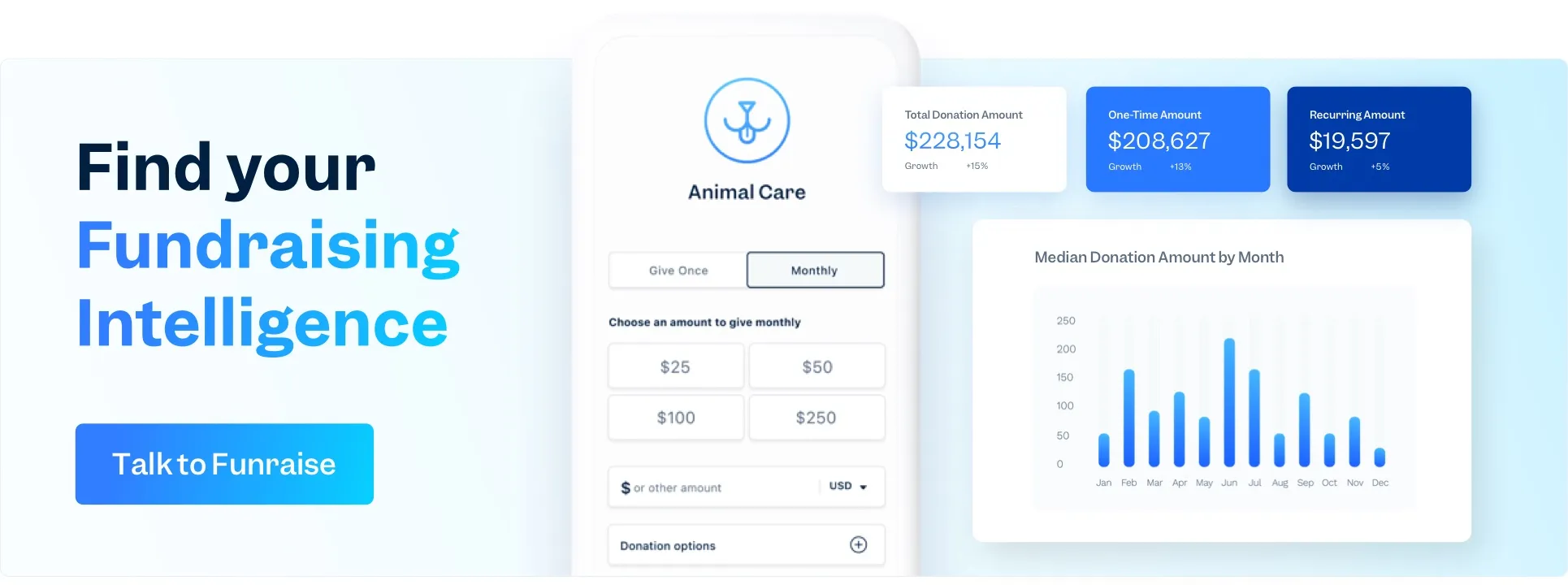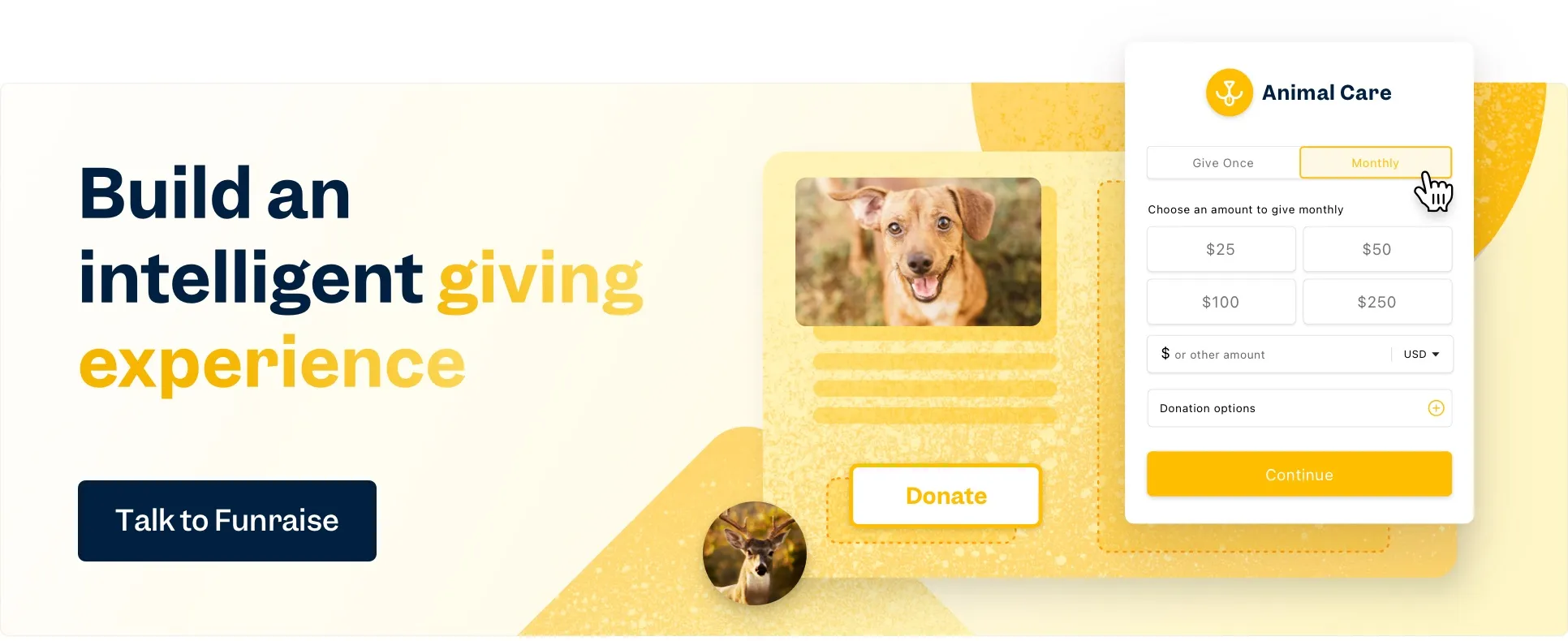Do you know someone who doesn’t realize their awesomeness? Who denies themselves necessities because they “don’t really need them”? The kind of person whose socks could be knocked off by something you know is essential?
We know someone like that: Your organization.
So ask yourself, "Do I need a CRM?"
Do I need a CRM? How to Find Out in 7 Steps
As a nonprofit, your mission makes your world go round. But as a business, that honor goes to your donors. So, it stands to reason that you want to keep track of their every movement (but not in a creepy way) to nurture those relationships and raise those funds. And while spreadsheets and a Rolodex are all well and good to a point, most growing nonprofits eventually turn to a donor CRM system to track that indispensable customer data and manage those all-important customer relationships.
Let’s take a quick step back: a CRM, or customer relationship management software (or, occasionally, constituent relationship management software. Yeah, acronyms are weird.), is a mighty software that helps you track and wrangle all your donor data in one place. If you’re thinking, “Why do I need a CRM?” that’s a valid question. Is your donor list growing? Are your spreadsheets getting unwieldier by the day? Are you starting more and more emails with, “Apologies for the delay …”?
If you answered “yes,” however begrudgingly, to any of those questions, then this guide is for you. We’ll break down whether or not you need a CRM through a series of carefully curated steps, review all the reasons this software solution could make your life easier, and also consider when you’d be better served by holding off–at least for now. First up: seven easy steps to figure out if you need a CRM in the first place.
1. Gather your stakeholders
First, get your team members on board! They know what the day-to-day looks like at your nonprofit, and they understand what your customer base needs. So, you want to have them involved in all your CRM discussions. Aim for a cross-functional group, including members of your development team and marketing team.
2. Assess your current needs
What issues are you trying to solve with CRM software? What are your goals? What are your pain points? Make a list of your objectives, big and small, whether it’s sending those monthly board updates on time, remembering a new donor’s birthday, or following up with potential customers.
3. Consider your future needs
If your nonprofit is on the small business side, you might have already decided you don’t need a CRM solution. But wait! Is there a possibility that could change in the coming months or years? Perhaps you have a big event coming up with a bunch of new leads. Wouldn’t it be nice to follow up with a single click thanks to real-time profile updates? Look into your crystal ball and update your list of objectives accordingly.
4. Analyze and prioritize your list
Now, you’ve got a list of everything in your organization that needs a little help. As a group, review common CRM features, and then go through that list and note if a CRM solution can actually improve things. For example, say your monthly email marketing outreach always goes out late. CRM software can certainly help with marketing automation, ensuring timely delivery. On the other hand, if one of your pain points is making phone calls to each new donor to set up a coffee date, we regret to inform you that your friendly CRM isn’t a cyborg, and you should probably hire more development staff. Afterward, rank your list in order of importance so you know what really matters.
5. Identify CRM solutions
If a CRM looks like a distinct possibility, it’s time to review actual CRM platforms. Get thee to Google and peruse some best-of lists, but don’t only focus on giants like Salesforce. Remember that bigger often means more expensive, with many features you won’t use. Plus, smaller platforms may have better customer service. Next, streamline your options by evaluating the various CRM tools and features. In the end, draft a list of 3-5 possibilities that will lead to the right CRM for you.
6. Try things out!
We’re in the final stretch of determining whether you need a CRM! With your list of CRM software contenders in hand, you can start getting some hands-on experience. Many CRMs offer free trial versions, while others will let you do a demo if you connect with a sales rep. And as much as we know you don’t want to be hassled by slick sales shows, these are people who talk to organizations just like yours every day—you may learn something valuable! If nothing else, a demo and convo with a sales rep will give you an idea of the software company’s compatibility with your style of communication. As you sample the different products, consider the learning curve, functionality, cost, and unique features.
7. Choose the best CRM
If you had a positive experience with one of your CRMs, congratulations! You’ve realized that you do indeed need a CRM. Now, you just need to connect with the sales team (if you haven’t already), purchase the best option, and get ready for some customer relationship management magic. And if not, just take a step back and peruse some other options at your leisure.
Get the best donor management tools with Funraise
Why use a CRM system?
Every day, we’re bombarded with texts, ads, and emails telling us we need to get the latest software, app, or breezy summer maxi dress, or else we’ll be doomed forever. Some of these things will truly make our lives easier and better; others, not so much. That makes it really tricky to know what’s a must-have product and what’s a waste-o’-money product. But fear not! If you’re drumming your fingers on the keyboard, asking yourself, “Do I really need CRM software?” or “Why use a CRM system?” we’re here to break down all the reasons to immerse yourself in the wonderful world of CRM systems.
Also, if you’re one step ahead and have already decided that CRM software is right for you (spoiler: we’re team CRM and think you’ve made a great decision!), check out “What Is Donor Management Software?” for a broader explanation of what to look for when choosing a CRM solution.
1. Become a master communicator
As your nonprofit grows, you have more and more customer information to keep track of. Donor touchpoints, prospect names, household relationships, important dates–the list goes on and on, and something is bound to fall through the cracks. A CRM system provides a full picture of every donor relationship. Every major gift, phone call, employment change, and birthday is right there, and you can set reminders to follow up with tailored outreach in a timely manner. That frees you and your staff to maintain that BFF status with every donor through personalized, regular communication. Plus, you won’t accidentally invite Dave to your annual gala three times because sooommmeone didn’t write it down when they sent that initial email. So many wins.
2. Make sense of your data
Data is a whole lotta numbers, and often, it just sits there, all data-like. With the right tools, however, your data is a wealth of insights that can inform and improve your strategy. For instance, with a CRM platform, you can optimize marketing campaigns by viewing KPIs over time or increase customer retention by seeing what facets of the customer experience lead to conversion. Once those numbers have been transformed into actionable items, the fundraising sky’s the limit, friend.
3. Automate it all
Listen: your CRM can’t forge strong relationships and grab happy hour with a prospective donor. But it can automate time-consuming daily tasks and streamline business processes, freeing your amazing staff members up to do all those things that require a human touch. From monthly newsletters to event correspondence to board reports, a CRM system puts it all on autopilot, which means an improved customer experience and greater customer retention.
4. Collaborate seamlessly
Your staff members are essentially the salespeople of your nonprofit. They’re out there building those relationships, ensuring every donor feels warm and fuzzy. But everyone has their own workflows and preferences, and some staff members love a pad of paper while others swear by Excel. A CRM ensures one system to rule them all and one source of truth across the organization. Also, when a staff member (gulp) leaves, there’s no need to worry about all that goodwill and knowledge going poof! With a CRM system, every donor detail is available for everyone. No institutional knowledge lost, and no donor left behind.
5. Plan fabulous events
We all know that planning and running nonprofit fundraising events takes time, money, time, energy, and … did we mention time? Fortunately, many CRMs have tools to help with event management, from virtual event livestreaming capabilities to event registration and ticket sales. And need we remind you that every donor profile will automatically update with that vital information, leading to increased customer satisfaction? We love to see it.
6. Centralize your everything
We’ve discussed how a CRM system gathers all your donor data in one place, but did you know that it can also pull in all the data from your other favorite tools? From digital marketing to social media fundraising, it’s your one-stop-shop for everything you need to know to get your nonprofit running like a well-oiled machine.
Sign up for Funraise now
At what point does a business need a CRM system?
In our humble opinion, any business or nonprofit can benefit from a CRM solution. That being said, it’s especially important for small, growth-minded businesses. At that point, CRM software will help you organize your data, up your efficiency, strengthen your relationships, and optimize your fundraising efforts.
What are some signs that your organization should move from zero to CRM hero? All your donor names will no longer fit on a single piece of paper and you’re in need of some improved contact management. You’ve noticed that staff members keep dropping the ball when it comes to remembering donor names, meeting deadlines, and noting important customer interactions. Or perhaps you’re flitting between a half-dozen different platforms every day, jotting down different data points before your next board meeting.
Another good time to go CRM? If you’re embarking on a strategic planning process. A CRM system can ensure you have every data point you need in one place, plus it can help parse and make sense of what all that data means for your overall strategy.
What happens when you don’t have a CRM?
The downsides of not having a CRM include decreased efficiency, productivity, and profitability. If your nonprofit expands, you’ll feel it even more. Your team will be stretched thin, leading to more mistakes and poor communication. Finally, your strategy won’t be informed by actual trends and accurate data, stalling future growth.
1. Customer retention suffers
Without detailed donor profiles, you can’t personalize communications, ensure everyone receives prompt outreach, and provide superlative customer support. The result? Donors leave. Additionally, a CRM helps you identify lapsed donors so you can bring them back into the fold.
2. You spend more time and money
How many hours does it take to manually enter every attendee’s attendance and donation information after a big event? What about creating templates from scratch for every piece of email outreach? Your staff has better things to do with their time, and automation is your friend. With a CRM system, you’re investing in your organization’s future and saving your awesome staff member’s from the most boring parts of their job.
3. Prospective donors slip away
If you want new customers, you need to keep track of every detail about every prospective donor and follow up consistently. But if you’re just jotting down names on a napkin, it’s going to be hard to do that, and that multi-billionaire who was really looking to give away half of her fortune for tax reasons is going to find another place to donate.
4. Your strategy suffers
With customized dashboards and reports, CRM software makes it easy to see what worked and what didn’t. You can use these insights to spot trends and think strategically about the future of your organization.
5. You miss out on key fundraising opportunities
For example, many companies offer matching gifts, literally doubling your donations. But many donors don’t realize this option exists. Happily, some CRMs (like Funraise!) offer an integrated company search feature that lets donors see whether their company will match their gift with a single click. Then, the matching process automatically begins.
6. Your data’s at risk
In addition to storing all your essential customer information, CRM software helps you store that precious data securely. No need to worry about data privacy or payment fraud; you can sleep soundly at night, knowing that your data’s in safe, cloud-based hands.
Why you don't need a CRM (and what to use instead)
While we (clearly) love a CRM, sometimes, it’s simply not the time to get one–at least not yet. Here are a few times when you don’t need a CRM.
1. It’s you and only you.
If you’re saving the world as a one-person team, with nary a staff member or volunteer to manage, a CRM system could be overkill. You know what works best for you, so it’s fine to stick with that. For now.
2. All your fundraising comes from corporations and foundations.
If you don’t get donations from individual donors, your needs look much different, and you won’t use a lot of the features offered by CRM software. ...but think about the fact that there are grant management systems out there!
3. Your team’s not on board.
If your team isn’t Team CRM, direct them to this article and try again! But seriously, a CRM system’s a big commitment, meant to reduce silos and improve collaboration, and you want everyone to be excited about it. Make sure everyone’s ready to forge ahead before making the investment.
4. You don’t have the funds.
If you simply don’t have the funds for a CRM solution, it’s okay to hit pause. However, you can also sign up for a 100% free version of Funraise, which includes all the CRM basics (and then some), such as donor profile, recurring giving tools, reports, events and ticketing, and donation receipt automation. You can upgrade as you grow, when you have the need and the funds!
Make donor management manageable with Funraise
Why do I need a CRM? Key takeaways
- A CRM, or “customer relationship management,” system is a type of software that helps you manage all your customer information, communications, and relationships in one centralized place.
- CRM software helps you make data-based decisions through custom reports and dashboards.
- And CRM software does a lot more than just store donor names and numbers. From marketing tools to social media integrations, campaign sites to event planning, a good CRM system is your key to increased productivity and profitability.
- Without a CRM, you’ll take a hit when it comes to donor retention, prospect follow-up, collaboration, and strategic planning.
- If you’re on the fence about getting a CRM, sign up for a free version or schedule a demo.































.webp)
.webp)











.webp)
.webp)

.webp)
.webp)
.webp)




